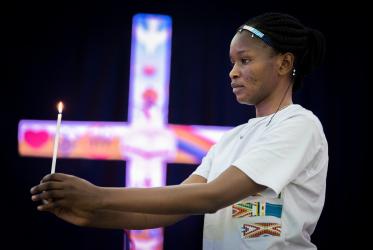A World Council of Churches (WCC) seminar has marked the strengthening of relationships between the WCC and the Global Christian Forum (GCF), affirming their distinctive and complementary roles in the quest for Christian unity.
Held on 11 September in Geneva, Switzerland, the seminar brought together representatives of the WCC and GCF, along with members of other international ecumenical organizations.
The GCF, established in 1990s following a call from the WCC 8th Assembly in Harare, was founded to create a space to bring together churches and organizations not structurally part of the WCC with those already engaged in councils of churches.
The GCF now represents diverse churches and Christian organizations, promoting encounters among churches and traditions which previously have not been in conversation with each other.
At the seminar, the Rev. Dr Olav Fykse Tveit, general secretary of the WCC, spoke about “conciliar ecumenism and the role of councils in rapidly changing ecclesial landscapes”. The term “conciliar” refers to formal councils and conferences of churches at national, regional and international levels.
Quoting Paul’s letter to the Romans, Tveit stressed the need of “welcoming one another, appreciating one another and calling one another in Christian unity” despite differences in traditions and practices.
The importance of Christian unity is significantly reflected in the theme of the WCC’s Busan assembly, “God of life, lead us to justice and peace”, Tveit continued.
A WCC statement on unity, which will be presented at the assembly in Busan, observes that the “unity of the Church, the unity of the human community and the unity of the whole creation belong together.”
Tveit added that “to seek Christian unity we have to recognize the importance of mutual accountability, which is the pulse of conciliar ecumenism. With this spirit, we can turn the challenges of division into opportunities and work together towards justice and peace.”
New challenges, new initiatives
Rev. Wesley Granberg-Michaelson, member of the GCF committee and general secretary emeritus of the Reformed Church in America focussed in his presentation on the new developments in World Christianity: “We are living in the most significant times of change in Christian history, depicting a shift in the presence of the world’s Christians,”
“This shift is not only visible to the South, but also to the East. We are observing a spiritual resurgence of non-Western Christianity throughout the world,” said Granberg-Michaelson, who is author of a book titled From Times Square to Timbuktu: The Post Christian West Meets the Non-Western Church.
He stressed the significance of councils and forums in seeking Christian unity, especially as part of preparations for the WCC’s upcoming assembly, to be held from 30 October through 8 November in Busan, Republic of Korea.
“On our way to Busan, we need to ask ourselves what is the scope of these changes and what does this mean for our common search towards Christian unity,” added Granberg-Michaelson.
He argued that it is important to bring previously isolated Christian traditions like those of Evangelicals and Pentecostals into ecumenical encounters, focusing on shared values of spirituality.
“It is a common calling of forums like GCF to help build enduring and trustworthy bridges that overcome distance, barriers, suspicion and isolation between different streams of world Christianity,” Michaelson said.
Rev. Dr Richard Howell, member of the GCF committee and general secretary of the Asia Evangelical Alliance, also addressed the seminar.
“There are several examples of the GCF initiatives where the concept of ‘sharing of faith and journeying together with Christ’ has helped to break the walls of prejudice among Christian traditions, including Catholic, Pentecostal and Charismatic traditions,” said Howell.
He shared examples from Asia, where joint collaborations between the [Roman Catholic] Federation of Asian Bishops' Conferences and the Christian Conference of Asia managed to extend voices of those who were not part of the ecumenical dialogue before.
Howell added that as part of such initiatives, GCF will organize programmes using the document Christian Witness in a Multi-Religious World, produced jointly by the WCC, the World Evangelical Alliance and the Roman Catholic Church, for further discussions on Christian unity.
The seminar was facilitated by the Rev. Dr Walter Altmann, moderator of the WCC Central Committee, and the Rev. Dr Sarah Rowland Jones, committee member of the GCF. Current plans of the GCF were introduced briefly by the Rev. Dr Larry Miller, secretary of that body.
WCC and the ecumenical movement in the 21st century
Unity statement: God’s Gift and Call to Unity - and our Commitment







